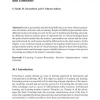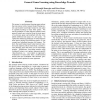288 search results - page 19 / 58 » Learning to Play Chess Using Temporal Differences |
124
click to vote
ICANN
2010
Springer
15 years 3 months ago
2010
Springer
We propose a model of the hippocampus aimed at learning the timed association between subsequent sensory events. The properties of the neural network allow it to learn and predict ...
171
click to vote
WCE
2008
15 years 4 months ago
2008
Abstract Emotion, personality and individual differences are those effective parameters on human's activities such as learning. People with different personalities show differ...
104
click to vote
CVPR
2006
IEEE
16 years 4 months ago
2006
IEEE
An activity consists of an actor performing a series of actions in a pre-defined temporal order. An action is an individual atomic unit of an activity. Different instances of the ...
126
click to vote
IJCAI
2007
15 years 4 months ago
2007
We present a reinforcement learning game player that can interact with a General Game Playing system and transfer knowledge learned in one game to expedite learning in many other ...
125
click to vote
ECAI
2006
Springer
15 years 6 months ago
2006
Springer
Emotions play a very important role in human behaviour and social interaction. In this paper we present a control architecture which uses emotions in the behaviour selection proces...


